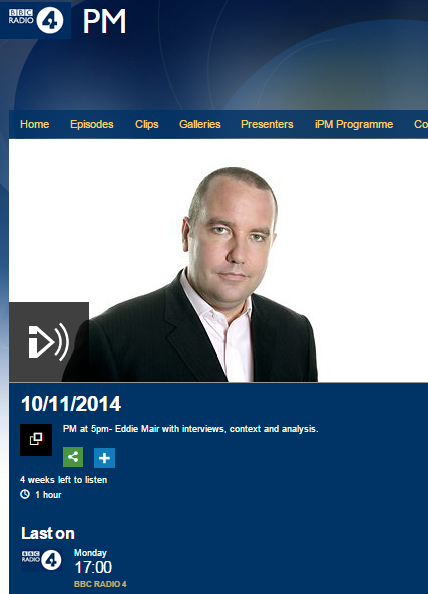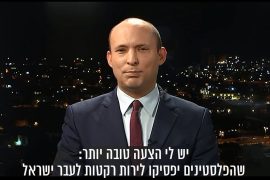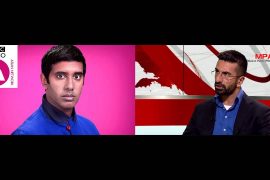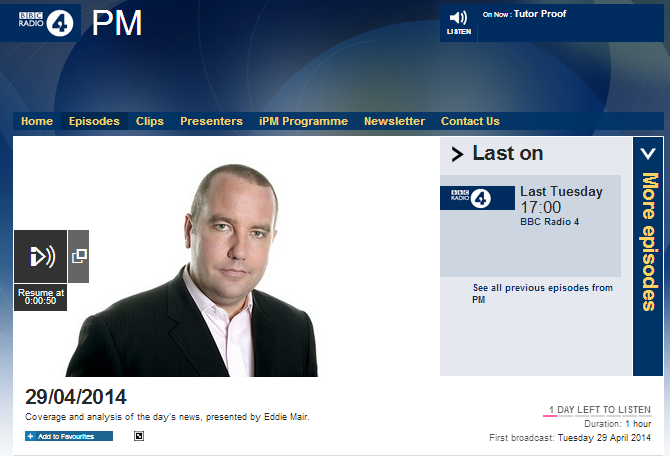In two previous posts concerning the December 17th ‘Today’ programme live broadcast from the Gaza Strip (here and here) we saw how well-worn BBC themes were promoted in that programme.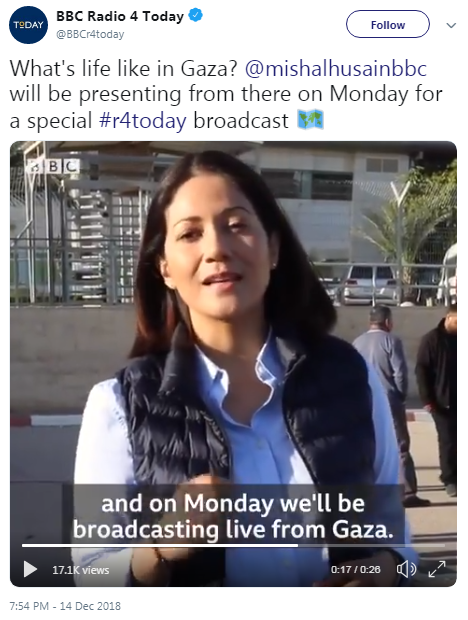
In a third ten minute-long segment (from 1:16:27 here) listeners once again heard from representatives of international organisations rather than the “people on both sides of the divide” as promised by presenter Mishal Husain.
The two themes of blaming the economic and humanitarian situation in the Gaza Strip on counter-terrorism measures employed by Israel (with a cursory mention of Egypt) and providing unquestioning and context-free promotion of UNRWA were repeated in that segment too.
Husain began with misrepresentation of a press release put out by UNOCHA, claiming that its appeal for funding is intended to provide aid to the entire population of the Gaza Strip. [emphasis in italics in the original, emphasis in bold added]
Husain: “As the United Nations appeals for funds to support 2 million Palestinians who live here [Gaza] saying that living conditions are deplorable, the UK has today pledged £5 million in emergency food aid.”
The UNOCHA statement actually describes the scope of its appeal thus:
“The 2019 HRP appeals for $350 million to provide basic food, protection, health care, shelter, water and sanitation to 1.4 million Palestinians, who have been identified as most in need of humanitarian interventions in the Gaza Strip and the West Bank, including East Jerusalem.”
In other words, Husain once again misled BBC audiences by claiming that all 2 million residents of the Gaza Strip are in need of foreign aid. She continued with repetition of previously heard messaging.
Husain: “But the dire economic reality is taking immense toll on people’s lives. Unemployment is at 50%. Even those who have jobs often receive only half their salary. The economy has been impacted by a blockade maintained by Israel and Egypt citing security reasons. Incomes have also been affected by Palestinian Authority sanctions on Hamas which has been in full control of Gaza since 2007. In recent weeks aid from Qatar has been making a difference but it will only last till April.”
As was the case in the first hour of the programme, listeners were told nothing of the Hamas terrorism which has made counter-terrorism measures in the form of restrictions on the movement of people and dual-use goods necessary. Once again the very relevant issue of Hamas’ prioritisation of terrorism over the well-being of Gaza’s civilian population went unmentioned. Likewise the topic of “Palestinian Authority sanctions on Hamas” was not expanded and so listeners were unable to comprehend what aspects of the situation in the Gaza Strip (e.g. electricity shortages, shortages of medicines, unpaid wages) have been brought about by internal Palestinian disputes rather than by Israeli actions.
Husain similarly failed to tell listeners why there are still Palestinian refugees in a place that has been ruled by Palestinians for over 13 years before re-introducing her next guest.
Husain: “More than half of Gaza’s population are registered refugees and Matthias Schmale – head of Gaza operations for UNRWA, the UN agency for Palestinian refugees – took me to see one of the eight camps in this small stretch of land.”
During Husain’s walkabout with Schmale listeners heard that “more than 90% of the population don’t have access to safe drinking water” and that “the desalination system in Gaza has broken down” because of “electricity”. No effort was made to clarify the full background to those statements or to explain that – as the BBC knows – the electricity crisis in the Gaza Strip (and resulting problems with water and sewage) has nothing to do with “the blockade”.
Listeners heard more repetition of this programme’s prime messaging.
Husain: “When you say that people are living in poverty, why is that?”
Schmale: “The answer to that is twelve years of blockade. We live in a place that is very small; 40 kms by 6 to 12 kms in width and there’s almost 2 million people living in this constrained space and it’s completely sealed off from the rest of the world.”
Husain: “Hamas is governing Gaza. Shouldn’t it be providing for people here rather than you?”
Schmale: “Yes, I think the responsibility of host authorities is to cater to essentials – provide essential services like electricity, like water, like proper sewage and I think the fact that much of that is non-functional is a reflection of ten years of failed government by the Hamas authorities.”
That of course would have been the ideal moment for Mishal Husain to explain to listeners how Hamas has spent millions of dollars on the construction of cross-border attack tunnels and other terror infrastructure but instead listeners heard about “warm winter sunshine”. Husain likewise avoided the highly relevant topic of Hamas terrorism in the part of her conversation with Schmale concerning fishing.
Husain: “There’s a young man I can see in a small boat just beneath us by the water’s edge. What about fishing? Can people make a living from fishing?”
Schmale: “One of the constant debates with Israel is the fishing zone because in order to fish for safe fish that are not contaminated by the water we see coming out of that pipe you need to be a distance out and they say…”
Husain: “How far are they allowed to go out?”
Schmale: “At the moment 3 miles and 3 miles is not enough.”
Husain then did another pointless tick of the impartiality box which contributed nothing to audience understanding.
Husain: “Israel says the blockade is maintained for security reasons and indeed Egypt also blockades on Gaza’s other border.”
Husain and Schmale visited an UNRWA food distribution centre in the Shati refugee camp.
Schmale: “About 60% of the million people that get food from us [are] living with abject poverty as we call it. That means on about a dollar – just a bit more than a dollar – a day. So about 600 thousand people really depend on this food. They would not survive if they didn’t have this.” […]
Husain: “Who pays for all of this food?”
Schmale: “The biggest donor until the beginning of this year was the United States. For Gaza we need roughly $110 million per year. Last year – 2017 – we got 90 million of 110 million from the United States. 80 million of that was food. As a result of their dramatic cut in the beginning of the year, we ran out of money for this at the end of June. We were only able to continue it and what you’re seeing today because the rest of the organisation [the UN] gave us an advance. We took a loan.” […]
Husain: “So what are you going to do in the long run?”
Schmale: “My hope is that appeals to the international community to prevent Gaza sliding into a Yemen-style situation of massive hunger will be heard.”
Remarkably, listeners were then told that the situation in the Gaza Strip is not connected to armed conflict.
Husain: “You’ve worked all over the world. What do you think of what you see here? How does it compare with what you see elsewhere?”
Schmale: “The disasters I have encountered were either natural – a tsunami, an earthquake – or man-made in terms of war. This is the first time I’m confronted with a humanitarian crisis that is entirely man-made as a result of the blockade. But if people had their own jobs and earned their own money, which they could have, we would not need to do this. Natural disasters are uncontrollable. This is controllable.”
The interview closed with the repetition of a statement from Schmale that had already been heard earlier on in the programme.
Husain: “If there was a different security situation – Israel would say it’s not possible with the current reality, the current stance of Hamas towards it.”
Schmale: “I understand the security argument but I also think that we need to be very careful not to put the entire 2 million population into that basket. You know I would claim that the Israelis know so well what goes on in here and know who the potential people are that would hold a security threat to them. If they wanted to they could with reasonable safety let the peace-loving population go out and earn a living for themselves.”
Once again listeners did not hear any Israeli response to the idea that Gaza residents should and could be allowed to work in Israel “with reasonable safety” – despite the past history of dozens of terror attacks perpetrated by workers from the Gaza Strip.
With UNRWA’s politicised messaging having gone completely unchallenged and with no effort having been made to provide vital background information concerning that organisation and its mission, Hamas terrorism, Hamas’ financial prioritisation of terrorism over civilian welfare and the Hamas-Fatah split, Husain then handed over to the BBC’s economic correspondent who – as we shall see in the next post – interviewed yet another person who does not fall into the “ordinary people” category.
Related Articles:
BBC Radio 4 ‘Today’ Gaza Strip special – part one
BBC Radio 4 ‘Today’ Gaza Strip special – part two
One to listen out for tomorrow on BBC Radio 4
Mishal Husain does ‘life in Gaza’ for BBC One TV
Documenting BBC amplification of an UNRWA campaign

